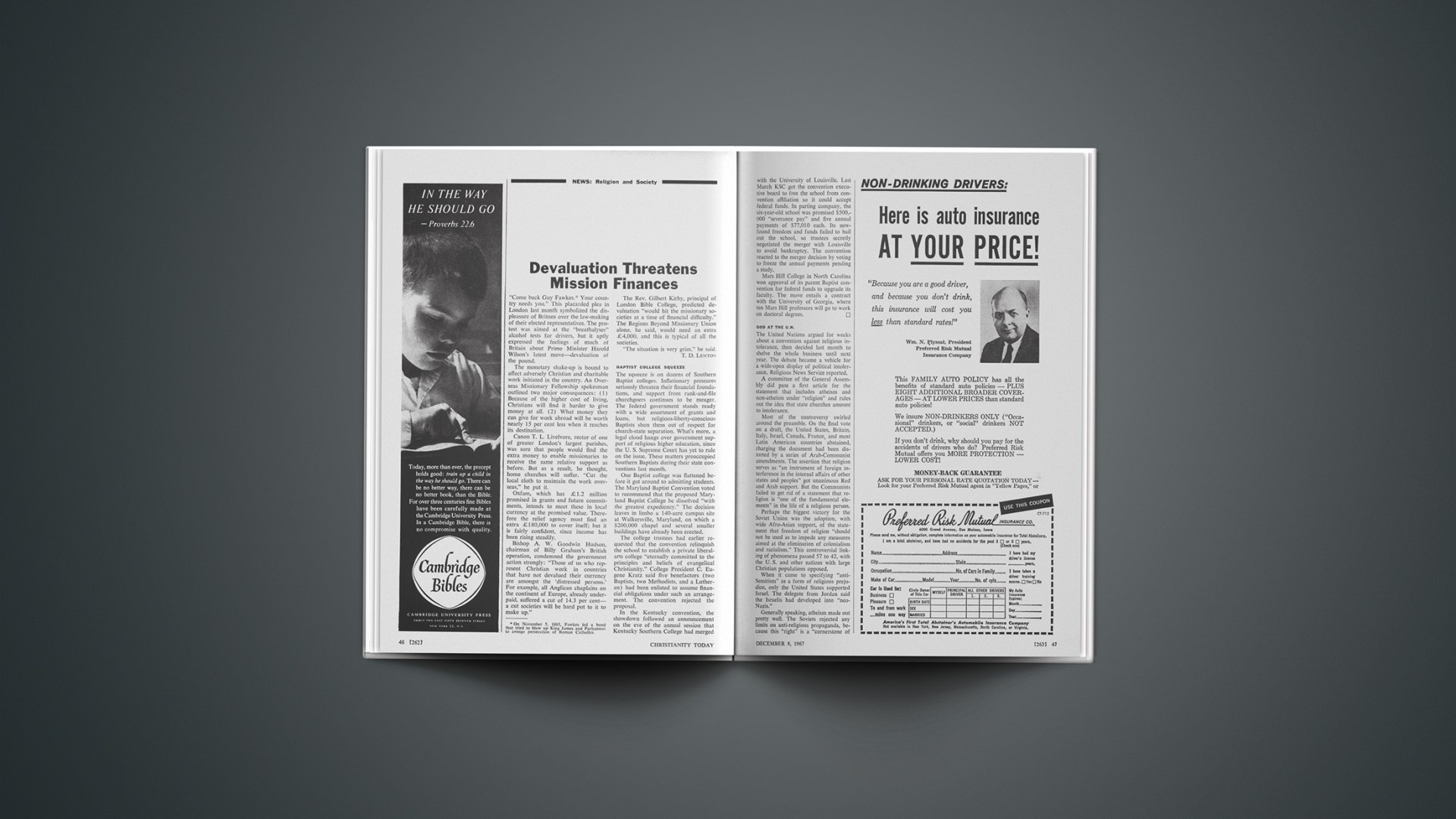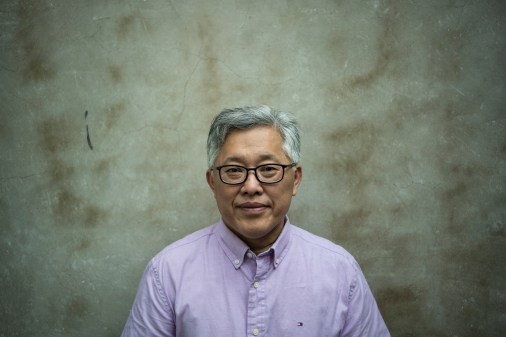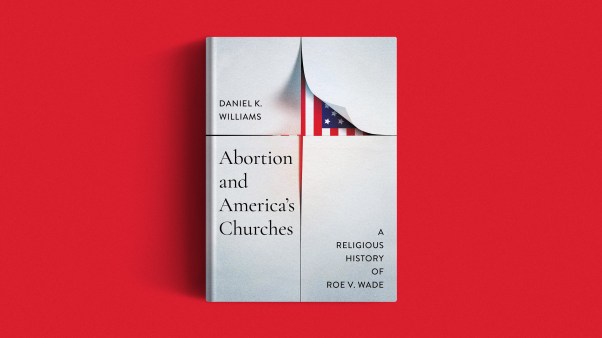“Come back Guy Fawkes.1On November 5, 1605, Fawkes led a band that tried to blow up King James and Parliament to avenge persecution of Roman Catholics. Your country needs you.” This placarded plea in London last month symbolized the displeasure of Britons over the law-making of their elected representatives. The protest was aimed at the “breathalyser” alcohol tests for drivers, but it aptly expressed the feelings of much of Britain about Prime Minister Harold Wilson’s latest move—devaluation of the pound.
The monetary shake-up is bound to affect adversely Christian and charitable work initiated in the country. An Overseas Missionary Fellowship spokesman outlined two major consequences: (1) Because of the higher cost of living, Christians will find it harder to give money at all. (2) What money they can give for work abroad will be worth nearly 15 per cent less when it reaches its destination.
Canon T. L. Livelvore, rector of one of greater London’s largest parishes, was sure that people would find the extra money to enable missionaries to receive the same relative support as before. But as a result, he thought, home churches will suffer. “Cut the local cloth to maintain the work overseas,” he put it.
Oxfam, which has £1.2 million promised in grants and future commitments, intends to meet these in local currency at the promised value. Therefore the relief agency must find an extra £180,000 to cover itself; but it is fairly confident, since income has been rising steadily.
Bishop A. W. Goodwin Hudson, chairman of Billy Graham’s British operation, condemned the government action strongly: “Those of us who represent Christian work in countries that have not devalued their currency are amongst the ‘distressed persons.’ For example, all Anglican chaplains on the continent of Europe, already underpaid, suffered a cut of 14.3 per cent—a cut societies will be hard put to it to make up.”
The Rev. Gilbert Kirby, principal of London Bible College, predicted devaluation “would hit the missionary societies at a time of financial difficulty.” The Regions Beyond Missionary Union alone, he said, would need an extra £4,000, and this is typical of all the societies.
“The situation is very grim,” he said.
BAPTIST COLLEGE SQUEEZE
The squeeze is on dozens of Southern Baptist colleges. Inflationary pressures seriously threaten their financial foundations, and support from rank-and-file churchgoers continues to be meager. The federal government stands ready with a wide assortment of grants and loans, but religious-liberty-conscious Baptists shun them out of respect for church-state separation. What’s more, a legal cloud hangs over government support of religious higher education, since the U. S. Supreme Court has yet to rule on the issue. These matters preoccupied Southern Baptists during their state conventions last month.
One Baptist college was flattened before it got around to admitting students. The Maryland Baptist Convention voted to recommend that the proposed Maryland Baptist College be dissolved “with the greatest expediency.” The decision leaves in limbo a 140-acre campus site at Walkersville, Maryland, on which a $200,000 chapel and several smaller buildings have already been erected.
The college trustees had earlier requested that the convention relinquish the school to establish a private liberal-arts college “eternally committed to the principles and beliefs of evangelical Christianity.” College President C. Eugene Kratz said five benefactors (two Baptists, two Methodists, and a Lutheran) had been enlisted to assume financial obligations under such an arrangement. The convention rejected the proposal.
In the Kentucky convention, the showdown followed an announcement on the eve of the annual session that Kentucky Southern College had merged with the University of Louisville. Last March KSC got the convention executive board to free the school from convention affiliation so it could accept federal funds. In parting company, the six-year-old school was promised $500,000 “severance pay” and five annual payments of $77,010 each. Its newfound freedom and funds failed to bail out the school, so trustees secretly negotiated the merger with Louisville to avoid bankruptcy. The convention reacted to the merger decision by voting to freeze the annual payments pending a study.
Mars Hill College in North Carolina won approval of its parent Baptist convention for federal funds to upgrade its faculty. The move entails a contract with the University of Georgia, where ten Mars Hill professors will go to work on doctoral degrees.
GOD AT THE U.N.
The United Nations argued for weeks about a convention against religious intolerance, then decided last month to shelve the whole business until next year. The debate became a vehicle for a wide-open display of political intolerance, Religious News Service reported.
A committee of the General Assembly did pass a first article for the statement that includes atheism and non-atheism under “religion” and rules out the idea that state churches amount to intolerance.
Most of the controversy swirled around the preamble. On the final vote on a draft, the United States, Britain, Italy, Israel, Canada, France, and most Latin American countries abstained, charging the document had been distorted by a series of Arab-Communist amendments. The assertion that religion serves as “an instrument of foreign interference in the internal affairs of other states and peoples” got unanimous Red and Arab support. But the Communists failed to get rid of a statement that religion is “one of the fundamental elements” in the life of a religious person.
Perhaps the biggest victory for the Soviet Union was the adoption, with wide Afro-Asian support, of the statement that freedom of religion “should not be used as to impede any measures aimed at the elimination of colonialism and racialism.” This controversial linking of phenomena passed 57 to 42, with the U. S. and other nations with large Christian populations opposed.
When it came to specifying “anti-Semitism” as a form of religious prejudice, only the United States supported Israel. The delegate from Jordan said the Israelis had developed into “neo-Nazis.”
Generally speaking, atheism made out pretty well. The Soviets rejected any limits on anti-religious propaganda, because this “right” is a “cornerstone of the Soviet constitution.” During the debates, Albania announced officially through a state magazine that it is the world’s “first atheist state.” Something of a lonely voice, post-Sukarno Indonesia said the U. N. should “recognize the belief in God Almighty as the basis for every state” and “a cornerstone in nation and character building.”
A British spokesman called the adopted preamble “a non-believers’ charter,” and a Canadian delegate, relieved the matter was tabled, said the emerging document would have been something only Communists could sign “in good conscience.”
MAOISTS ON MACAO
On the tiny island of Macao, where Portuguese authorities are puppets of Chinese Communists, the Roman Catholic Church has found itself at serious odds with the situation.
Vatican-appointed clerics had to swallow particularly hard when the local government suspended publication of two Catholic periodicals, one for ten days and the other for twenty. At issue was a statement made by the Catholic Bishop of Macao, Dom Paulo Jose Tavares. The offense charged by the government was “failure to submit the statement first to the censor.”
Ever since Red Guard riots and violence humiliated the Portuguese authorities early this year, Communist pressure has been building up on the six-square-mile enclave situated forty-five miles across the Pearl River estuary from Hong Kong. Until recently, the Communists’ main religious target was St. Joseph’s College, where a series of demonstrations forced many students to leave. The current enrollment of 350 students (there were 800 last year), is a measure of Communist success in its drive either to eliminate Catholic schools altogether or to impose Marxist teaching upon them.
Catholic schools on Macao still claim the most students: a total of 50,000. Communist schools have about 16,000 and Protestant schools 7,000.
Tavares, after a long silence, spelled out the church’s stand against leftist demands, and the ax immediately fell upon the two publications that ran the statement.
The turmoil on Macao discouraged tourists last summer, with a consequent loss of dollars needed to prop up the island’s sagging economy. Ho Yin, the leading Communist fat-cat on Macao, in order to get back some tourist trade, is seeking to curb the more extreme elements of his Red Guard mobs and is cooperating with the local visitors’ bureau on gimmicks to lure travelers.
The latest come-on is a troupe of bare-breasted Japanese dancers performing in a waterfront casino. So successful have they been in drawing decadent capitalists from Hong Kong that topless teams are being recruited from France, and a mixed-nationality girlie group—to include “dark-skinned African girls”—was promised for Christmas.
Significantly, no protest has been raised against these goings-on by the Catholics, the traditional guardians of Macao public morality. The silence is a sign of the rapid waning of Roman authority.
MICHAEL BROWNE
HOFFA LOSES—AGAIN
Former union mogul James Hoffa, languishing in the Lewisburg, Pennsylvania, penitentiary, has been denied a visit from his personal pastor, Monsignor W. Joyce Russell of St. Catherine Labourne Church, Wheaton, Maryland.
The priest declined comment except to say that Hoffa had wanted to discuss “spiritual matters.” The prison director said rules allowed no outside clergymen and plenty of local priests were available.
DEATH WISH
When a despondent, alcoholic, minority-race person commits suicide, it’s a statistic. But when a successful, white, conservative Protestant psychiatrist plans to take his life, that’s an enigma.
For both, it may well be isolation that leads them to suicide, the ninth highest cause of death among American men.
A panel of psychiatrists, psychologists, physicians, and educators in San Francisco, the city with the dubious distinction of having the highest national rate of suicide and of alcoholism, concluded: The principal cause of suicide or the use of “suicide equivalents” is the inability of millions to live in a world of violence, bribery, and moral corruption—a life opposed to their early teachings.
San Francisco psychologist Joel Fort said American society has a destructive element that causes millions to seek “suicide equivalents” which—perhaps subconsciously—bring about the death wish. These include the “drop-out life styles” of alcoholics, deviates, drug addicts, and even cigarette smokers, he said.
Michael Peck of the Los Angeles Suicide Prevention Center hit alienation as a leading cause of suicide, especially among teen-agers. A preferred adolescent technique is to “shoot yourself with your father’s revolver while at home with one or both parents,” he said. Peck concluded: “A gross lack of communication existed between [these] parents and their children.”
But what about that psychiatrist who apparently has everything to live for? Writing anonymously in the Christian Medical Society Journal, he claims support for his suicide plan in the Bible. And pastors who must face distraught parishioners may well ponder his charge:
“Christianity holds out the promise of closeness with God, but it is here it often fails miserably.”
‘PROJECT EQUALITY’ CASE STUDY
Project Equality, a national religious campaign to press equal job opportunity for all races, has not been accepted equally or with equanimity in Minnesota. Some congregations have quietly shelved the project without bringing it to a decision, some have voted against it, and some are still debating whether to join.
The debate involves Protestants and Jews, whose congregations are deciding for themselves, individually, what to do. All Roman Catholic parishes have been committed to the program by their bishops.
A Project Equality coordinator for one major denomination said the most resistance comes from churches already involved in building-fund campaigns. They fear they will lose contributions if they join the program. This strikes at the heart of the idea, since construction is the area where churches can carry the most weight, by dealing only with businesses that hire persons from minority groups.
The project office, opened in April by the Minnesota Council on Religion and Race, says 1,172 out of 2,512 congregations and religious organizations have signed up. (The figures do not include Missouri Synod Lutherans, who joined recently.)
The Minnesota experiment is significant because of the state’s small percentage of Negroes and its freedom from major racial disturbances. The controversy centers on whether churches should use their economic clout through boycotts to back the principles they espouse.
The pastor of a large downtown Minneapolis church that has tabled the issue explains, “I feel a good deal can be said on either side.” In other cases ministers have exerted pressure to get their churches involved.
Opponents—not confined to businessmen or to any one denomination—think churches would be more effective with job training, low-income housing, or direct poverty aid. Others say the project is outdated because business already provides equal opportunity through voluntary action or mandatory federal requirements.
Proponents say the project should be but one part of church involvement. Without positive action, they argue, the $80 billion in church assets exerts a negative influence nationally (see September 29 issue, page 24).
Project Equality plans to intensify its efforts and, by next summer, to review the compliance of businesses and list them in a buyer’s guide. The churches will be expected to follow the guide. When these judgments are made and things get specific, the now-placid debate may well intensify.
JOHN NOVOTNEY
BLACK CHRIST
Negroes are beginning to rally to the idea that Jesus was black and that black power is strongly rooted in the Old Testament, Detroit clergyman and civil-rights leader Albert C. Cleage believes.
“Since we put a Black Madonna picture in the church, we’ve doubled everything,” he said during the U. S. Conference on Church and Society in October. His Central United Church of Christ, the only known black nationalist Christian church in the nation, worships a black Messiah.
Membership in the church has climbed steadily since last July’s violence erupted a few blocks away.
Cleage—who earnestly maintains that Christ was a black man—doesn’t mince words: “There is no escape for you,” he tells his congregation. “When white people try to tell you that good niggers can get through this golden door of integration, don’t believe it. We don’t even want that door, because that’s destroying us.”
Nor is Cleage a voice in the wilderness. In a tense confrontation scene filmed in Chicago and televised on the Public Broadcasting Laboratory’s premiere show November 5, Negro militant Russ Meek wilted a white woman who wanted to discuss the redeeming quality of Christian love. “We don’t want you to love us. We don’t love you,” he shouted.
Cleage’s “black theology” extends to the Bible. The original Jews, he contends, were black, and Abraham “was a deep tan to start with.”
Meanwhile, former heavyweight boxing champion Cassius Clay told 200 Negro students at the University of Pennsylvania during a Black Muslim recruiting session that the “only hope” for Negroes is to unite and separate from white people. White students were barred from the meeting.
An experiment in “black ecumenism”—reportedly designed to cooperate with white-dominated denominations—took shape last month with the election of North Carolina Bishop Herbert L. Shaw of the African Methodist Episcopal Zion Church as president of the National Committee of Negro Churchmen. A spokesman said the group, now representing twelve denominations, hopes to extend to almost every American Negro church.
The Rev. Edler Hawkins, former moderator of the United Presbyterian Church, was named treasurer, and the National Council of Churches’ Charles Spivey was part of the constituting session in Dallas.










